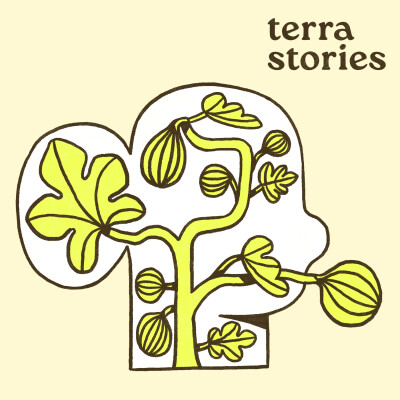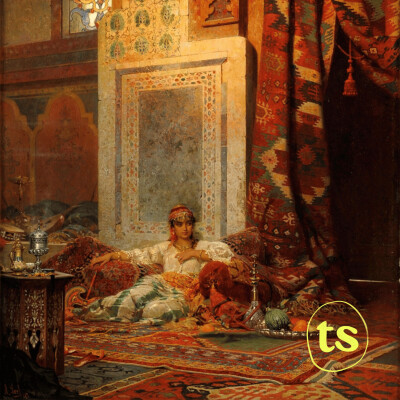GiuliaWhat would you do if you stood before the spirit of the forest? What would it look like? How would you feel? And how would you treat its forest? Hi, I'm Giulia and this is Terra Stories, a podcast that through storytelling opens your mind to new perspectives, helping you reconnect with yourself, with nature, and with your role in shaping a harmonious world. Today, I want to share a story with you. A story as old as time. Not just because I love it, but because it holds deep wisdom. A wisdom that, in many ways, the Western world has forgotten, but needs to remember. Because stories shape the world we live in. They create our reality. To truly understand a culture or civilisation, you need to understand the stories they tell themselves. Those stories are the foundation of our knowledge, our wisdom, and ultimately our actions. And what happens when we stop telling those stories? Those stories full of ancient, important wisdom. Without minds, without imagination to pass them along, they just fade away. They're not even memories of the past, they are nothing. And yet they were everything. This story I want to tell you today comes from the Epic of Gilgamesh, one of the oldest written works we have from our Western civilisation. It was written in Mesopotamia around 3000 BC, and it touches on themes of mortality, the divine, and humanity's relationship with nature. While writing this story on clay tablets was a new thing for them, the stories themselves were not. They may have been passed down orally from generation to generation, with the mind acting as a vessel, carrying those stories across continents and through time. And now, here it is, entering your mind. You are the vessel now. In The Forest Journey, one of the early chapters of the Epic of Gilgamesh, King Gilgamesh and his friend Enkidu decide to kill Humbaba, the protector of the sacred trees, a spirit of the forest, placed there by Enlil, one of their gods. As I tell you this story and share some translated moments with you, pay attention to your emotions, to what it stirs inside you. Stories are keys to unlock wisdom and emotions within us. So we have to listen closely. Before his quest to kill Humbaba, Gilgamesh gathers with some of the townspeople of Uruk, and he tells them, 'I, Gilgamesh, go to see that creator of whom such things are spoken, the rumor of whose name fills the world. I will conquer him in his cedar wood and show the strength of the sons of Uruk. All the world shall know of it. I am committed to this enterprise, to climb the mountain, to cut down the cedar, and leave behind me an enduring name.' The people, of course, warn him to be careful, because Humbaba is not a simple adversary. 'He is the spirit of the forest. He is strong and powerful, they say. Humbaba is not like men who die. His weapons are such that none can stand against them. The forest stretches for 10,000 leagues in every direction. Who would willingly go down to explore its depths? As for Humbaba, when he roars, it's like the torrent of the storm. His breath is like fire, and his jaws are death itself. Why do you crave to do this thing, Gilgamesh?' But in the end, what we understand is that Gilgamesh wants to be as high as the gods, because when you are, you can choose who lives and who dies, right? So he goes. He takes Enkidu, his friend, and they go. Once they are in the cedar woods, they have dreams; some that warn them to abandon their quest. But pride is too high, and Gilgamesh begins to cut some trees, provoking the fury of Humbaba. Though Humbaba pleads for mercy, Gilgamesh, urged by Enkidu, kills him to secure his glory. It's written, 'At the third blow, Humbaba fell.' And I don't know about you, but I can really imagine the big sound shaking the earth beneath your feet. A sound you know there's no coming back from. It's written: 'Then there followed confusion. For this was the guardian of the forest whom they had felled to the ground. For as far as two leagues, the Sedars shivered when Enkidu felled the guardian of the forest. He, at whose voice Hermon and Lebanon used to tremble. Now the mountains were moved and all the hills for the guardian of the forest was killed. They attacked the cedars, and the seven splendours of Umbaba were extinguished. They set Umbaba before the gods. before Enlil. They kissed the ground and dropped the shroud, and set the head before him. When he saw the head of Humbaba, Enlil enraged at them. "Why did you do this thing? From henceforth, may the fire be on your faces, may it eat the bread that you eat, may it drink where you drink." Then Enlil took again the blaze and the seven splendours that had been Humbaba's. He gave the first to the river, and he gave to the lion, to the stone of execration, to the mountain, and to the dreaded daughter of the queen of hell.' So the gods get angry. Of course they do. They get angry because when you kill the spirit of the forest, you kill the balance. And when you do that, there are consequences. Don't brush your shoulder at the gods. Because you are a simple mortal. Be careful. Be careful. I don't know what you felt while listening to this story, but it was very powerful to me. But if we were telling that story today, would we still disrespect the forest, nature, as we do? Would we kill Humbaba, deforest his land, and kill his animals? Would we really want to unleash the wrath of the gods? One might think, do we need to fear the gods to respect the forest? And I ask myself this question too. Honestly, I don't think there is a right answer. Human minds are very complex. But I think the gods represent a higher force. The sun, the moon, the water, all tied to natural powers. So it wasn't really about fearing the god Enlil, for example, but rather about recognising his power, acknowledging that there are higher forces and understanding our place as humans in the world. It's all about respect and humility. While that respect should come naturally, I also agree that there's no need for divine wrath to get the points across, but stories are vessels of wisdom, and they convey messages in ways we sometimes need to hear. Then I thought, if we were ancient people, wouldn't we think that we've already unleashed the wrath of the gods? Look at all the wild fires, the floods, and the disasters happening in our world. They're signs, aren't they? The gods have already answered, and they're angry. If you read the Epic of Gilgamesh, the Old Testament, and many other ancient texts, the gods often respond in floods. For Gilgamesh, it was a reminder that he had done something he shouldn't have. While this story just rested in my mind, I spent a month on a friend's farm. On a rainy and dreamy Saturday, they decided to show me a Japanese anime movie they love, Princess Mononoke. Directed in 1997 by Ayao Miyazaki. They told me before we watched it that inside his stories, powerful messages about humans and their connection to nature were held. When I nodded, I didn't know yet that I would watch a retelling of an old myth, Humbaba's story, 5,000 years later. Before me, on a screen, in a colourful and motionful way, unfolding was a story as old as time. Do not mess. with the spirits of the forest. Be careful, be careful. It is the story of Ashitaka, who's saving his village from a monster is cursed. To lift the curse, he embarks on a long journey and gets involved in the conflict between two warring clans, the humans and the forest spirits. Ding ding, the mind light bulb shines. I don't want to spoil the story for you. I really advise you to go watch it. It's on Netflix and it's just wonderful. As you may guess, the human clan comes very close to destroying the forest and its spirit, taking the form of a beautiful many-horned elk. What happens is terrible. until they don't destroy it, and nature has never been so beautiful. So here we are again, listening to the same story, yet from another distant culture, over and over. This story is still alive in some places. Some are nearly forgotten, while others are held in the voice of a grandmother, telling it to her grandsons or granddaughters, hoping they will be the vessel. For example, have you heard of the Leshi in Slavic mythology? The Leshi is the deity of the forest, and for me, it's a mix of Humbaba and the spirit of the forest in Princess Mononoke, a large creature with horns. Today, many Indigenous cultures still believe spirits inhabit and protect trees. I heard in a small extract from a Waterbear production called Shiringa, that the Awajún people in the Amazon rainforest say: 'This forest is not only plants and animals, it also has guardian spirits, and we work with them.' I also came across an article on Mongabay about the Dayak tribes of Borneo and their traditions of performing rituals throughout the agricultural cycle. They see agriculture not just as a means of sustenance but also as a way to communicate with their gods. This deep spiritual connection to the land helps them to be more united as a community and resist deforestation caused by monoculture and mining. One example is the Aruh Mahanyari ritual, where for a certain period, villagers stop farming, hunting or even cutting trees. Even picking leaves is forbidden. Violating these traditions, like cutting down a tree, is seen as a sign of disrespect to the gods. Indigenous people are the best stewards of biodiversity. Why don't we continue as they do, telling those stories? Why aren't they taught in schools or before closing our eyes at night? Why not teach our culture that we must stay humble? and that there are forces we do not control. And oh Lord, if we try. But this story also teaches us that living in harmony with nature and with ourselves is possible. Even in old Europe, for thousands of years, people lived in harmony with nature, sitting around the fire and telling those stories. In a different way, yes, but the message was always there. Times are tough, but I know many people are doing incredible work to safeguard nature, and that gives me hope. It's a constant battle, I know, but we must stay hopeful. As Christina Mittermeier said in an interview for the Voices of Wilderness podcast show, when people went into battle with their adversary across the field, they raised their weapons and marched forward with hope. They had to have hope. It was their lands, their people, and their future generations at stake. So we must, too. Let's be the storytelling animal we are. Let's share those stories. Let's leave the forests alone and enjoy their beauty. Let's walk among them and revere them. Because we never know, Humbaba could be hiding behind a tree. Thank you for listening to this podcast episode. I hope you enjoyed it. If you did, please share it with those around you and rate the podcast five stars on the platform you're listening on. If it deeply resonated with you, feel free to share your thoughts with me on Instagram at @terrastories.studio. Thank you.





